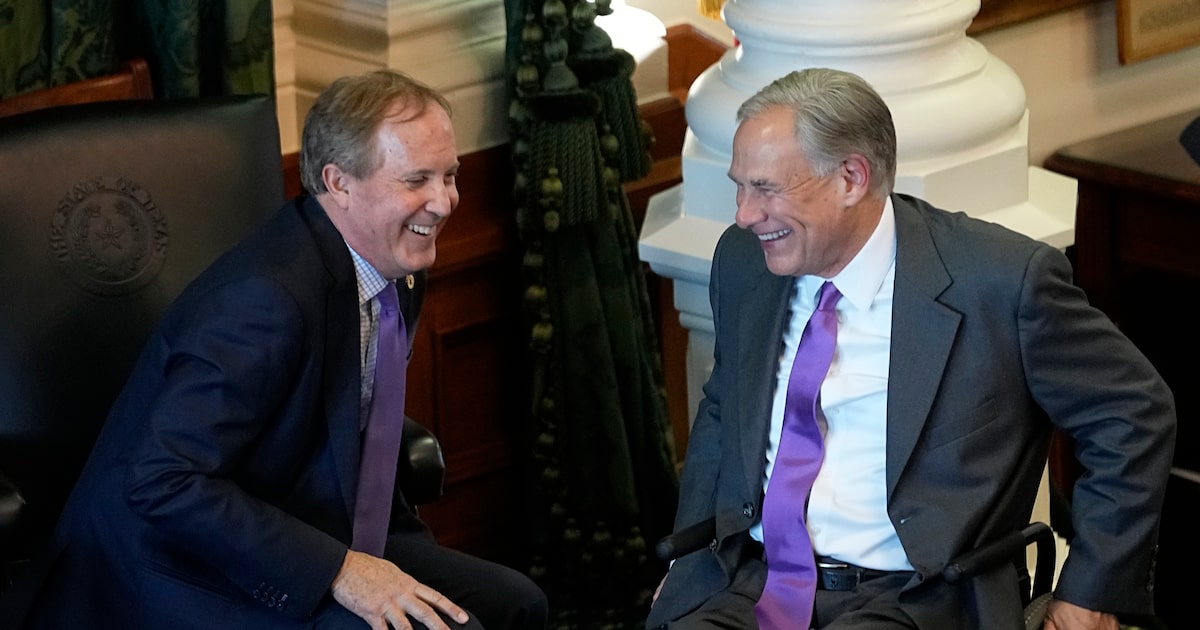Fight primary overreach
Re: “Paxton: Close GOP primary — Texas attorney general asks court to strike down law barring it,” Saturday Metro and Business story.
Attorney General Ken Paxton’s push for closed primaries raises serious concerns. He’s challenging Sen. John Cornyn in the 2026 primary while advocating to change election rules that could benefit his campaign. This is a clear conflict of interest that undermines electoral integrity.
If primaries are private party functions, shouldn’t parties fund them privately rather than using taxpayer dollars and state infrastructure?
More troubling is how this erodes democratic norms. Gerrymandered districts — Texas’ new normal — heavily favor one party, meaning most elections are decided in primaries, not November.
Opinion
Closing primaries would silence minority-party voters and the growing number of independents, denying them their only meaningful voice.
With primary turnout at just 18% in 2024, this would concentrate power further in partisan hands.
Every Texan valuing fair representation must stand against this overreach. As Ronald Reagan warned, “Freedom is a fragile thing and it’s never more than one generation away from extinction … it must be fought for and defended constantly by each generation.”
Alfonso Cevola, Dallas/Lake Highlands
Voter system threatened
It’s easy to understand why Attorney General Ken Paxton wants to create a closed primary in Texas. If a large number of Democrats vote in the Republican primary for Sen. John Cornyn, Paxton’s chances of winning are greatly diminished.
Right now, Texas has open primaries. In other words, every voter in Texas is just that, a voter, and can vote in any primary they wish. Nowhere on your voter ID does it say Republican or Democrat.
If the Senate and the House change the whole voting system to a closed primary, then all of us would have to re-register and designate a party. It seems like a lot to accomplish before March, but never underestimate Texas Republicans’ willingness to shove a change down our throats if it’s to their benefit.
David Seay, Plano
Save City Hall
Re: “Save it or tear it down? Debate over the future of City Hall begins as repair costs could hit $100 million,” Oct. 5 news story.
So, what type of mushrooms are city officials munching on these days? Are we seriously sacrificing the I.M. Pei-designed Dallas City Hall to a team that traded away Luka Dončić?
With such reasoning, where would a new city hall go — the former Valley View site in North Dallas, the logistics center along Interstate 20 in southern Dallas or why not in Frisco? And the cost of building a new city hall could be double or triple that cost for making needed repairs to the existing city hall. Oh gosh, please repair Dallas City Hall!
There are other in-town Dallas locations to build a temple to basketball.
Start with the huge surface parking lots downtown at Field Street and Woodall Rodgers Freeway between Fountain Place and the West End, or all that empty space bounded by Ross, Routh, Bryan and Leonard streets.
Deep Ellum is home to the city’s nondescript Central Service Center with 15-plus acres along Canton and Hall streets. Remember activating the Trinity River corridor along Riverfront Boulevard. Then what about the former Dawson State Jail property?
Let’s be a little more strategic in our city building while caring for our existing civic assets. Please stop dropping the ball!
Robert Louis Prejean, Dallas/Oak Lawn
Embrace clean energy
Texas has long been a leader in energy innovation, and today we have another opportunity to lead — by embracing clean energy solutions that strengthen our economy and protect our communities.
Wind and solar already support tens of thousands of jobs across the state and help keep electricity prices stable. Expanding investment in renewable energy, efficiency and modern grid technology can make Texas more resilient and independent, especially as extreme weather challenges our infrastructure.
By supporting policies that encourage clean energy development and carbon reduction, Texas can remain an energy powerhouse while safeguarding the future for our families.
It’s time to put our ingenuity to work for a cleaner, stronger and more secure Texas.
Shahmeer Mirza, Allen
Without phones, kids converse
I teach in a public high school in North Texas, where student phones are in their backpacks from bell to bell. It is wonderful to see students during passing periods in the halls talking to each other face to face, laughing, emoting.
Their behavior continues into the classroom where students are actually talking, laughing, asking questions. Conversing. It is delightful to know students/young adults have not forgotten how to interact face to face.
My hope is students learn to not depend on their phones for communication and realize the value of just talking with others face to face.
Christine Wilensky, Plano
A fair waffle then and now
Re: “Fairgoers may feel the bite as concession prices climb — Vendors say snacks, rides still a good deal even as costs go up,” Saturday news story.
This story trying to justify prices at the State Fair of Texas did a pretty poor job by leaving out comparisons. In 1961, the minimum wage was $1.15 an hour. That 85-cent waffle cost 51 minutes of minimum wage work. Today, at a minimum wage of $7.25 an hour, the $14 waffle costs 116 minutes of work, almost two hours of work for 10 minutes of pleasure.
Comparing average hourly income for the state, in 1964, it was $2.50 vs. $31.46 today. In 1964, it cost 21 minutes of work whereas now it costs 27 minutes of work.
Steve Jarboe, Carrollton

